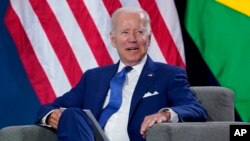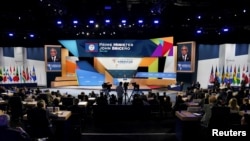U.S. President Joe Biden is hosting the Summit of the Americas in Los Angeles this week, bolstering engagement with leaders of Latin America and the Caribbean — regions where China is making deep economic and diplomatic inroads.
The administration is offering a series of economic, health and climate initiatives that it hopes will counter Beijing's growing influence and strengthen democratic partners — an approach similar to Biden's strategy toward Indo-Pacific countries during his trip to Asia last month.
In both regions, Biden's message is that countries will benefit by aligning themselves to his vision of economic prosperity: strengthening the middle class while committing to democracy, human rights, respect for the environment and the "international rules-based order."
"Trickle-down economics does not work," Biden repeatedly remarked during the summit, referring to the theory that financial benefits for corporations and the wealthy will trickle down to everyone else.
"When we invest in strengthening workers and the middle class," Biden said, "the poor have a ladder up, and those at the top do just fine. That's how we can increase opportunity and decrease persistent inequity."
That message may resonate in Latin America, one of the most unequal regions in the world, where the richest 10% of people enjoy 54% of the national income, according to the World Inequality Database.
The administration's modest initiatives and promise of more investment may not be enough to slow Beijing's rapid expansion in the region, however. Since Biden came into office early last year, China has widened its trade gap with the U.S. in large swaths of Latin America, according to a Reuters analysis of U.N. trade data from 2015 to 2021.
When Mexico, the top U.S. trade partner, is excluded, analysis of the latest available data shows that total trade flows — imports and exports — between Latin America and China reached nearly $247 billion last year, well above the $174 billion with the U.S.
Twenty-one out of 24 Latin American and Caribbean countries have signed on to the Belt and Road Initiative, China's signature global infrastructure investment project. Meanwhile, since its launch in June 2021 at the Group of Seven summit, Build Back Better World, Washington's counter to Beijing's vision, has yet to take off.
And although the U.S. donated almost 70 million doses of COVID-19 vaccines to the region since Biden took office, the U.S. had already fallen behind the communist superpower at the start of the pandemic. In the early phase of the crisis, it was China that Latin American and Caribbean countries depended on for their shots.
"The United States is playing catch-up," said Diego Abente Brun, director of the Latin American and Hemispheric Studies Program at George Washington University.
To do that, he said, the administration will need to take into account geopolitical vs. ideological considerations and "have a little bit more of a flexible approach" in dealing with countries such as Cuba, Venezuela and Nicaragua.
The three countries were not invited to the summit because they were deemed nondemocratic, prompting the boycott by leaders of several key partner nations such as Mexico, Honduras, Guatemala and Bolivia.
Trade and continuity
Observers have noted the administration's inability to offer what many in the region most desire: tariff cuts and other trade incentives that would facilitate deeper ties. With Trump-era protectionist sentiments still running high, Congress has little appetite for opening American market access.
Compared with China's one-party state, the politically polarized Washington has another disadvantage: The U.S. administration, and its policies, could change with each four-year election cycle.
"China is proposing cooperation for 2035 and 2050," said Enrique Dussel Peters, a professor at the Universidad Nacional Autónoma de México. "There is a very clear, long-term perspective."
"The U.S. used to be, a couple of decades ago, much more clear. You didn't have this political dispute that you have today," he told VOA.
With legislative proposals hamstrung by a polarized Congress, Biden is rallying American corporations to invest more in the region.
"When we combine the ability of government to direct economic activity towards specific challenges — to help mitigate risks, guard against unfair practices and create predictable demand — with the agility of the private sector, I believe we can deliver real improvement for people's lives," Biden said to business leaders during the summit.
While efforts to integrate the private sector are helpful, they face the same problem: the lack of a grand strategy, Dussel Peters said, noting that 80% of China's investment in Latin America has been made by public firms, including those owned by cities, provinces and other municipalities.
"China is very clearly working to integrate infrastructure, investments, trade, financing, et cetera. Their strategy is very clear, and not in the case of the United States."
Caribbean
As in its reaching out to small island nations in the Indo-Pacific region, where China has launched aggressive diplomatic overtures in recent years, Washington is wooing the countries and territories of the Caribbean.
"My intention is to intensify relationships with the Caribbean," Biden said in a meeting with Caribbean leaders on the sidelines of the summit. "You're critically important to us in every way, and I hope we're important to you."
The administration has proclaimed June as Caribbean American Heritage Month, highlighting Vice President Kamala Harris as the first Black American of Jamaican heritage to hold her office.
Harris announced a U.S.-Caribbean climate initiative that the administration says will bring "fresh commitments to — and integration of — climate adaptation and resilience and clean energy programs across the Caribbean region."
Beijing has long set its eyes on the Caribbean, bolstering trade, infrastructure investments and diplomatic engagement, wrote R. Evan Ellis, a professor of Latin American studies at the U.S. Army War College Strategic Studies Institute, in an October 2020 Wilson Center report.
The Caribbean provides important commercial access to the Atlantic coast for Chinese ships transiting the Panama Canal, and it shares characteristics with the islands of the South China Sea that Beijing wants to dominate. It is also an important voting bloc in the Organization of American States and other regional bodies, increasing its strategic value in multilateral diplomacy.
As part of its increased focus on China, the State Department is launching the so-called China House, an integrated team that plans to help coordinate and implement the nation's China policy, countering challenges ranging from maritime security to misinformation.
Nike Ching contributed to this report






